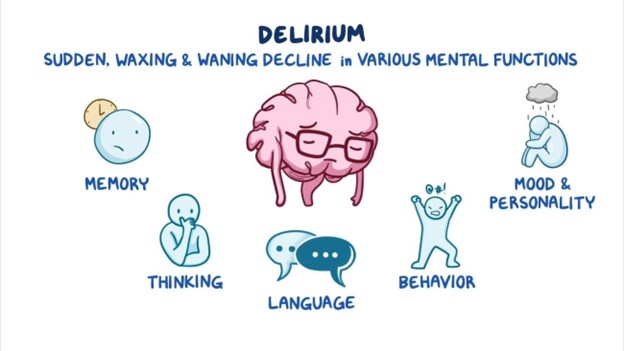According to the ATI video case study, Cognition: Delirium and Dementia, which of the following is the best first action for the nurse to take when caring for a client with delirium?

Identify the underlying cause
Tell the client that hallucinations are not real
Speak slowly and clearly
Request the assistance of physical therapy
The Correct Answer is A
Identify the underlying cause. This is correct because delirium is a reversible condition that is often caused by an underlying medical problem, such as infection, medication, or dehydration.
Identifying and treating the cause can help resolve the delirium and prevent further complications.
Tell the client that hallucinations are not real. This is incorrect because it can increase the client's anxiety and confusion. The nurse should acknowledge the client's feelings and perceptions, but not reinforce or argue with them.
Speak slowly and clearly. This is incorrect because it is not the best first action. While speaking slowly and clearly can help communicate with the client, it does not address the root cause of the delirium.
Request the assistance of physical therapy. This is incorrect because it is not relevant to the question. Physical therapy may be helpful for some clients with delirium, but it is not a priority intervention.
Nursing Test Bank
Naxlex Comprehensive Predictor Exams
Related Questions
Correct Answer is A
No explanation
Correct Answer is ["He is now quiet and appears sleepy."]
Explanation
He is now quiet and appears sleepy. This is correct because it indicates a change in the level of consciousness, which could be a sign of increased intracranial pressure or bleeding in the brain.
Whether you are a student looking to ace your exams or a practicing nurse seeking to enhance your expertise , our nursing education contents will empower you with the confidence and competence to make a difference in the lives of patients and become a respected leader in the healthcare field.
Visit Naxlex, invest in your future and unlock endless possibilities with our unparalleled nursing education contents today
Report Wrong Answer on the Current Question
Do you disagree with the answer? If yes, what is your expected answer? Explain.
Kindly be descriptive with the issue you are facing.
